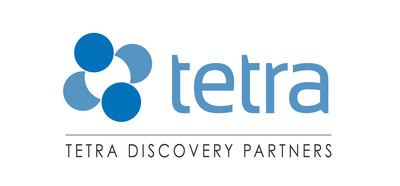Tetra Discovery Partners Initiates Phase 1 Study Of BPN14770, Under Development For Treatment And Prevention Of Alzheimer's Disease
GRAND RAPIDS, Mich., Dec. 9, 2015 /PRNewswire/ -- Tetra Discovery Partners ("Tetra") today announced that the company has initiated human Phase 1 safety trials of its lead compound BPN14770, which Tetra is developing as a potential treatment to both improve memory and slow the progression of Alzheimer's disease.

"There is a rapidly rising need for improved therapies for Alzheimer's disease. BPN14770 offers a novel approach that intervenes in important neural pathways related to learning and memory storage that underlie daily cognitive function in patients with Alzheimer's disease," said Mark Gurney, Ph.D., chairman and chief executive officer of Tetra. "Tetra Discovery has begun an initial human safety study with the compound in healthy volunteers, and expects to expand this to initial explorations of the compound benefit for cognition during 2016."
Tetra's Phase I clinical trials are designed to first evaluate BPN14770 in a single ascending dose study (SAD) to assess the safety, tolerability and pharmacokinetics in 48 healthy human volunteers. Endpoints for the study are safety, tolerability, and pharmacokinetics. Afterward, a multiple ascending dose (MAD) study will take place, enrolling young and elderly subjects to provide preliminary efficacy assessment of BPN14770 on long-term memory and other cognitive processes.
BPN14770 was developed through a cooperative research agreement with the National Institutes of Health (NIH) Blueprint Neurotherapeutics Network. "Tetra benefited greatly from the deep industry experience and commitment of NIH Blueprint consultants, CROs, and staff, the National Institute of Neurological Disorders & Stroke (NINDS) and the National Institute of Aging (NIA). The cooperative research program was milestone driven with a rigorous focus on meeting pharmaceutical industry metrics for CNS drug quality and safety. BPN14770 has shown efficacy in multiple animal models of learning and memory with an excellent safety margin for human clinical trials," commented Dr. Gurney.
"There is a great need for additional new drug targets and treatment approaches for Alzheimer's disease that effectively reduce symptoms, and potentially also slow disease progression," said Scott Reines, M.D., Ph.D., chief medical officer of Tetra. "Most current Alzheimer's disease drug development is focused on amyloid targeted approaches, which even if successful are likely to be more effective when used in combination with drugs addressing other mechanisms of the disease. The PDE4 biochemical pathway of memory and nerve synapse formation targeted by BPN14770 is well documented.
"Moreover," he added, "researchers have shown great interest in exploring how boosting synapse formation can potentially benefit not only Alzheimer's disease but also other cognitive disorders such as schizophrenia and learning/developmental disabilities, such as Fragile X syndrome. We greatly look forward to advancing our clinical studies of BPN14770 to understand its potential in treating these serious neurological conditions, which represent enormous unmet medical needs."
About BPN14770
BPN14770 is a first-in-class Phosphodiesterase 4D Negative Allosteric Modulator (PDE4D-NAM), with the unique potential to both improve memory and slow progression of Alzheimer's disease. Research has shown that the brain neuronal enzyme phosphodiesterase, sub-type 4D (PDE4D), modulates the formation of new synaptic connections between neurons, and plays a key role in learning and memory storage. Specifically, PDE4 inhibitors regulate signaling pathways relevant to learning and memory through the elevation of cyclic adenosine monophosphate (cAMP), consequent activation of protein kinase A (PKA), phosphorylation of the cAMP-response element binding protein (CREB), and thereby increase CRE activated gene transcription. Activation of the CREB pathway by a PDE4D inhibitor may restore synaptic function in AD patients, whether they have brain amyloid pathology or not.
Alzheimer's Disease
Alzheimer's disease (AD) is a neurodegenerative disorder that has a substantial impact on day-to-day functioning. The disease is characterized by progressive decline in cognitive function and worsening of behavioral symptoms over several years. In the U.S., with a current prevalence of 5.7 million people, AD is the most common neurological condition among the elderly and the sixth leading cause of all deaths. Despite its significant prevalence and increasing economic impact, the search for a disease modifying therapy has proved elusive. Drugs that address cognitive impairment, such as cholinesterase inhibitors, provide limited symptomatic improvement, and such drugs do not slow disease progression or delay the onset of Alzheimer's disease.
NIH Blueprint Neurotherapeutics Network
The Blueprint Neurotherapeutics Network (BPN) provides support for small molecule drug discovery and development, from hit-to-lead chemistry through Phase I clinical testing. The BPN offers funding for work that recipients wish to do, access to NIH-funded contract research organizations (CROs), and access to consultants with expertise in various aspects of drug discovery and development.
About Tetra Discovery Partners
Tetra Discovery Partners is focused on developing new treatments that bring clarity of thought to people suffering from Alzheimer's disease, schizophrenia, depression, Huntington's disease and traumatic brain injury (TBI). Tetra uses structure-guided drug design to discover mechanistically novel, allosteric inhibitors of phosphodiesterase 4 (PDE4), which plays a key role in memory formation and learning. Tetra is both a recipient of a NIH Blueprint Neurotherapeutics Network cooperative research agreement, and also receives major funding through the National Institute of Aging, and the National Institute of Mental Health Small Business Innovation Research (SBIR) program. Tetra Discovery Partners is headquartered in Grand Rapids, Michigan and maintains a business office in Cambridge, Massachusetts. For more information, please visit the company's website at http://www.tetradiscovery.com.
Contact:
Eric M. Nelson, Ph.D.
Vice President, Business Development
Tetra Discovery Partners, (919) 332-9080
info@tetradiscovery.com
For Media
Joan Kureczka, Kureczka/Martin Associates
Joan@kureczka-martin.com
(415) 821-2413
Logo - http://photos.prnewswire.com/prnh/20140409/DE00036LOGO
To view the original version on PR Newswire, visit:http://www.prnewswire.com/news-releases/tetra-discovery-initiates-phase-1-study-of-bpn14770-under-development-for-treatment-and-prevention-of-alzheimers-disease-300190260.html
SOURCE Tetra Discovery Partners

